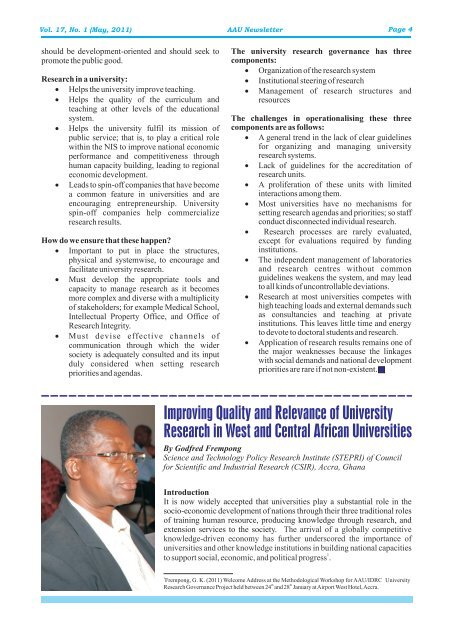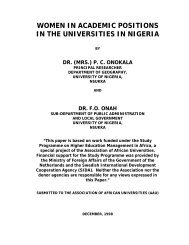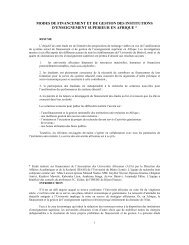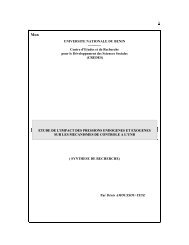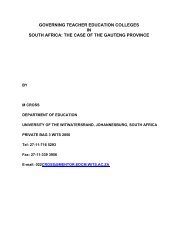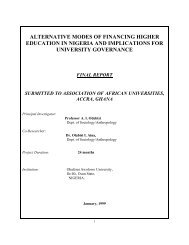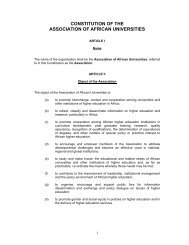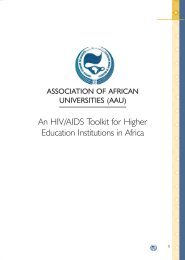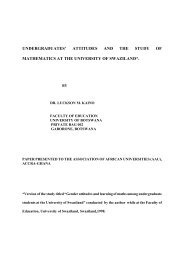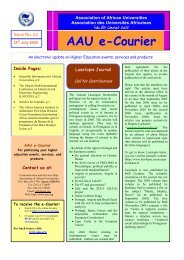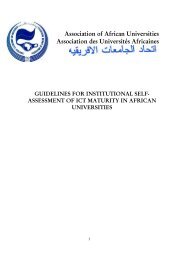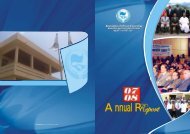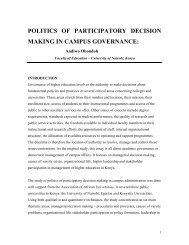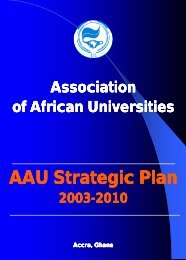<strong>Vol</strong>. <strong>17</strong>, No. 1 (May, <strong>2011</strong>) <strong>AAU</strong> NewsletterPage 4should be development-oriented and should seek topromote the public good.Research in a university:Helps the university improve teaching.Helps the quality of the curriculum andteaching at other levels of the educationalsystem.Helps the university fulfil its mission ofpublic service; that is, to play a critical rolewithin the NIS to improve national economicperformance and competitiveness throughhuman capacity building, leading to regionaleconomic development.Leads to spin-off companies that have becomea common feature in universities and areencouraging entrepreneurship. Universityspin-off companies help commercializeresearch results.How do we ensure that these happen?Important to put in place the structures,physical and systemwise, to encourage andfacilitate university research.Must develop the appropriate tools andcapacity to manage research as it becomesmore complex and diverse with a multiplicityof stakeholders; for example Medical School,Intellectual Property Office, and Office ofResearch Integrity.Must devise effective channels ofcommunication through which the widersociety is adequately consulted and its inputduly considered when setting researchpriorities and agendas.The university research governance has threecomponents:Organization of the research systemInstitutional steering of researchManagement of research structures andresourcesThe challenges in operationalising these threecomponents are as follows:A general trend in the lack of clear guidelinesfor organizing and managing universityresearch systems.Lack of guidelines for the accreditation ofresearch units.A proliferation of these units with limitedinteractions among them.Most universities have no mechanisms forsetting research agendas and priorities; so staffconduct disconnected individual research.Research processes are rarely evaluated,except for evaluations required by fundinginstitutions.The independent management of laboratoriesand research centres without commonguidelines weakens the system, and may leadto all kinds of uncontrollable deviations.Research at most universities competes withhigh teaching loads and external demands suchas consultancies and teaching at privateinstitutions. This leaves little time and energyto devote to doctoral students and research.Application of research results remains one ofthe major weaknesses because the linkageswith social demands and national developmentpriorities are rare if not non-existent.Improving Quality and Relevance of UniversityResearch in West and Central African UniversitiesBy Godfred FrempongScience and Technology Policy Research Institute (STEPRI) of Councilfor Scientific and Industrial Research (CSIR), Accra, GhanaIntroductionIt is now widely accepted that universities play a substantial role in thesocio-economic development of nations through their three traditional rolesof training human resource, producing knowledge through research, andextension services to the society. The arrival of a globally competitiveknowledge-driven economy has further underscored the importance ofuniversities and other knowledge institutions in building national capacities1to support social, economic, and political progress .1Frempong, G. K. (<strong>2011</strong>) Welcome Address at the Methodological Workshop for <strong>AAU</strong>/IDRC UniversityththResearch Governance Project held between 24 and 28 January at Airport West Hotel, Accra.
<strong>Vol</strong>. <strong>17</strong>, No. 1 (May, <strong>2011</strong>) <strong>AAU</strong> NewsletterPage 5The developed countries have registered much growth,because universities and other knowledge institutionshave been in the forefront of the development process.Countries like South Korea, Malaysia and Thailand hadsimilar economic situations like Ghana in the 1950s,but have experienced accelerated development due toincreasing and sustained development of their nationalcompetences in developing and applying science,technology and innovations (STI) developed byuniversities and other knowledge institutions.Research-based knowledge is now globally consideredto be a potent factor that enhances the socio-economicdevelopment of society. Consequently, there has beenmuch pressure on universities to deliver researchoutputs that respond to societal needs.The effectiveness of university research hinges on theexistence of an effective governance system thatprovides mechanisms for managing research andresources (human and material), ensuring high qualityand relevance of research, as well as engagement withknowledge users by the various university researchsystems. Consequently, there has been the need toreview and develop research governance policies tomake university research more responsive.IDRC/<strong>AAU</strong> University Research GovernanceProjectSeries of studies were commissioned in 2009 by theCanadian International Development Research Centre(IDRC) on university research governance in sixuniversities from five West and Central Africanuniversities: Université d’Abobo Adjamé (Côted’Ivoire), University of Buea (Cameroon), UniversitéCheikh Anta Diop and Université Gaston Berger(Senegal), University of Ghana, Legon (Ghana), andUniversité de Ouagadougou (Burkina Faso).The studies identified several gaps in structures foradministering, coordinating, and promoting research;the key ones being the following:• Gaps in linking university research withdevelopment priorities.• Weak linkages between knowledge producersand knowledge users.• Lack or seeming lack of interest in universityresearch by the political systems.• Lack of capacity for providing effectivedirection, organization and management of2university researchThese gaps always affect the ability of universities toconduct quality researches that are also relevant tonational development.The findings of these studies underscored the need forfurther rigorous analysis of the university researchgovernance system in West and Central Africa. Theproject has three key components: KnowledgeProduction, Institutional and Individual CapacityBuilding, and Multi-stakeholder Dialogue.ObjectivesThe main objective of the project is to strengthengovernance systems for research and foster betterlinkages between universities and other actors in thenational innovation systems to ensure qualityuniversity research and its relevance to local needs and3national development priorities . Besides, the otherobjectives are specific to each of the three areas of theproject. For Institutional and Individual CapacityBuilding, the objective is to contribute to theprofessionalization of the governance of universityresearch by developing and sharing tools and trainingmodules.With Multi-stakeholder Dialogue, it is to promotecontinuous dialogue and learning on the governance ofuniversity research through the development of acommunity of practice. Last but not least, KnowledgeProduction has the objective of generating pertinentknowledge on university research in West and CentralAfrica and making the knowledge generated availableto all stakeholders. These objectives will, invariably,contribute toward achieving the overarching aim of theproject.Activities of the ProjectSeveral activities have been identified under thevarious components of the project. KnowledgeProduction is basically a research on the universityresearch governance system. It will address the issueof national STI policies and university research, andmap existing national innovation systems to determinethe role and place of university research andinteractions with other actors. It will assess the existingmechanisms and practices on valorization anddissemination of research results in society, assess theconditions and practices that are necessary to buildsynergies between universities and end-users forsocio-economic development, and finally proposemeasures to integrate university research as a criticalpart of the national innovation system.Under Institutional and Individual Capacity Building,governance tools will, among others, address theResearch Strategic and Operational Plan, <strong>Resource</strong>Mobilization Plan, Administrative and FinancialProcedures Manual, and Code of Ethics. It will alsofocus on building capacities on science and technology2See <strong>AAU</strong> (2010) Improving The Quality And Relevance Of UniversityResearch Within National Innovation Systems In West And Central AfricaTheGovernance <strong>Issue</strong>s2See <strong>AAU</strong> (2010) Improving The Quality And Relevance Of UniversityResearch Within National Innovation Systems In West And CentralAfricaThe Governance <strong>Issue</strong>s
- Page 1 and 2: ISSN: 0855-0174 Vol. 17 No. 1 ( Jan
- Page 3: Vol. 17, No. 1 (May, 2011) AAU News
- Page 7 and 8: Vol. 17, No. 1 (May, 2011) AAU News
- Page 10 and 11: Vol. 17, No. 1 (May, 2011) AAU News
- Page 12 and 13: Vol. 17, No. 1 (May, 2011) AAU News
- Page 14 and 15: Vol. 17, No. 1 (May, 2011) AAU News
- Page 16 and 17: Vol. 17, No. 1 (May, 2011) AAU News
- Page 18 and 19: Vol. 17, No. 1 (May, 2011) AAU News


